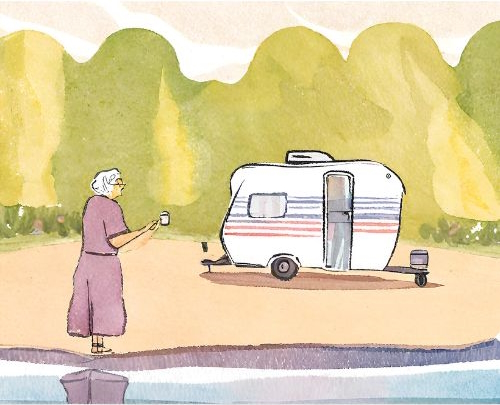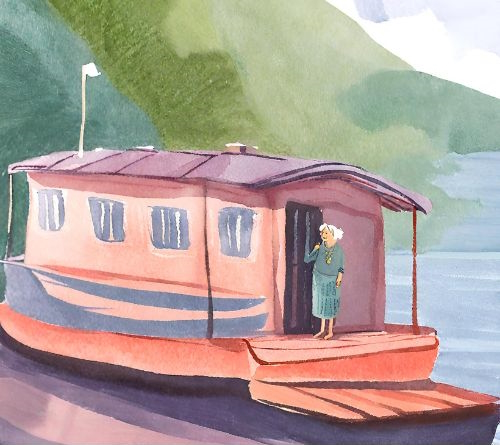Retirement is no longer a one-size-fits-all journey. As I get closer, and explore options beyond the conventional, I am giving a lot more thought to alternative retirement living ideas. As a long-time fiercely independent woman who has never been afraid of change, relocating, or adventure, I am keenly aware that the world is my oyster and my retirement years are my last hurrah for such experiences.
For more than a year now I’ve been exploring various options for my retirement. I still haven’t made a final decision, but I have taken some steps. Below is the research I’ve conducted so far. Sharing it with the hope that it will help other solo women out there to explore their options as well.
First, let me preface by saying that I have already built and owned a 4 bedroom 3 bath home on my own and then sold it to downsize. Despite having also donated or sold many of my belongings, I still haven’t downsized enough. I don’t want to continue to be “owned” by possessions. Freedom is much more important to me now. Possessions weigh me down. The desire for freedom informs the options I’ve chosen to explore and list below.
In general, I’ve also observed that there’s a growing trend among retirees to embrace alternative lifestyles. From downsizing to a tiny home to embracing van life or even becoming an expatriate, the retirement landscape is evolving. Let’s dive into the various unconventional ways individuals are redefining their golden years.
Table of Contents
- Downsizing to a Tiny Home
- Van/RV Life
- House-Sitting Worldwide
- Co-living with Other Retirees
- Becoming an Expatriate
- Renting a Room on a Cruise Ship
- Artistic Retreats and Communes
- Eco-Friendly Co-Housing
- Volunteer-Based Living
- Floating Homes/Marina Living
- Conclusion
Downsizing to a Tiny Home
Overview: Imagine trading in the sprawling family house for a cozy, minimalist haven. Tiny homes have become a symbol of sustainable living and financial freedom for retirees. I purchased plans for a tiny home about four years ago. Still unsure that’s the route I’m going, but I have the plans just in case.
Pros:
- Cost Savings: Tiny homes are more affordable, reducing both upfront and ongoing living expenses.
- Sustainability: Smaller spaces typically have a lower environmental impact, promoting eco-friendly living.
- Minimalist Lifestyle: Embrace a simplified and clutter-free lifestyle, focusing on essentials and reducing material possessions.
- Mobility: Many tiny homes are portable, allowing for a nomadic lifestyle or the flexibility to relocate.
- Customization: Despite the small size, tiny homes can be customized to meet individual preferences and needs.
Cons:
- Limited Space: Downsizing significantly means limited living space, requiring creative storage solutions and efficient use of every inch.
- Zoning and Legal Challenges: Finding suitable land and navigating zoning laws can be challenging for tiny home dwellers.
- Adjustment Period: Transitioning to a smaller living space may require time to adapt to the limited amenities and shared spaces.
- Resale Challenges: Tiny homes may have limited resale value, and finding a suitable buyer can be more challenging.
- Building Codes and Regulations: Complying with local building codes and regulations for tiny homes can be complex and varies by location.
[Some tiny home-related options through Amazon]
Van/RV Life
Overview: It might be best to just hit the open road and make every day an adventure. Van and RV life offer a nomadic retirement, allowing individuals to explore new places at their own pace.

Pros:
- Freedom of Travel: Embrace a nomadic lifestyle, with the ability to travel and explore diverse landscapes at will.
- Cost Savings: Save on traditional living expenses, including rent and utilities, promoting financial freedom.
- Minimalist Living: Experience a simplified and minimalist lifestyle, focusing on essentials and reducing material possessions.
- Connection to Nature: Live in close proximity to nature, enjoying outdoor activities and scenic locations.
- Flexibility: Easily change locations and adapt to different environments, providing flexibility in lifestyle.
Cons:
- Limited Space: The confined space of a van or RV may pose challenges, especially for those accustomed to larger living arrangements.
- Maintenance Challenges: RVs require regular maintenance, and breakdowns or repairs can be costly and inconvenient.
- Isolation at Times: Extended periods on the road may lead to isolation from friends and family, impacting social connections.
- Limited Amenities: RVs may lack certain amenities found in traditional homes, requiring adjustments in daily routines.
- Legal and Parking Concerns: Finding suitable and legal parking spots, especially in urban areas, can be a challenge.
[Some van/RV-related options through Amazon]
House-Sitting Worldwide
Overview: Jet-setting retirees can indulge their wanderlust by house-sitting across the globe. This unique arrangement involves caring for someone else’s home while enjoying a taste of local life.
Pros:
- Cost Savings: House-sitting provides free accommodation, allowing for significant cost savings during travel.
- Diverse Locations: Explore various destinations worldwide, experiencing different cultures and lifestyles.
- Local Immersion: Live like a local, gaining a deeper understanding of the community and daily life.
- Flexible Lifestyle: Enjoy flexibility in travel plans and durations, adapting to personal preferences.
- Pet Companionship: Many house-sitting opportunities involve caring for pets, offering companionship for animal lovers.
Cons:
- Competition for Opportunities: Popular destinations may have high competition for house-sitting opportunities.
- Responsibilities: House-sitting involves responsibilities such as pet care and property maintenance, requiring commitment.
- Unpredictability: Plans may change unexpectedly, impacting travel arrangements and requiring adaptability.
- Limited Control over Housing: The condition of the house may vary, and preferences for living conditions may not always be met.
- Security Concerns: Being in an unfamiliar environment may raise security concerns, necessitating awareness and caution.
[Some house-sitting-related options through Amazon]
Co-living with Other Retirees
Overview: Breaking the traditional mold and purchasing a home with fellow retirees promotes shared responsibilities and resources and creates a supportive community.

Pros:
- Shared Costs: Co-living reduces individual living expenses, making retirement more financially sustainable.
- Companionship: Build strong connections with like-minded individuals, fostering a supportive and social environment.
- Community Engagement: Participate in group activities, outings, and shared responsibilities, promoting a sense of community.
- Security: Co-living can enhance personal safety, with neighbors providing an additional layer of security.
- Emotional Support: Enjoy emotional support from peers, particularly valuable in the transitions and challenges of retirement.
Cons:
- Differences in Lifestyle: Co-living may involve compromise, as individual preferences and lifestyles can differ.
- Decision-Making Challenges: Collaborative decision-making can be time-consuming and may lead to disagreements among residents.
- Limited Privacy: Shared living spaces may compromise individual privacy, impacting personal space.
- Dependency on Others: Residents may depend on others for certain needs, which could lead to challenges if expectations are not met.
- Potential for Conflict: Differences in personalities or expectations may result in conflicts, requiring effective communication and conflict resolution.
[Some co-living-related options through Amazon]
Becoming an Expatriate
Overview: For those seeking a change of scenery, becoming an expatriate involves relocating to a different country, often in pursuit of a lower cost of living or a more temperate climate.
Pros:
- Cultural Immersion: Experience a new culture firsthand, fostering personal growth and a broader worldview.
- Cost of Living: Some expatriate destinations offer a lower cost of living, allowing for potential financial benefits.
- Adventure and Exploration: Embrace the adventure of living in a foreign country, exploring new landscapes, cuisines, and traditions.
- Language Acquisition: Living in a foreign country provides the opportunity to learn or improve proficiency in a new language.
- Global Networking: Build a diverse network of friends and professionals from various backgrounds.
Cons:
- Cultural Adjustment: Adapting to a new culture may be challenging, leading to feelings of isolation or homesickness.
- Legal and Administrative Challenges: Navigating a new legal system and bureaucratic processes can be complex and time-consuming.
- Healthcare Considerations: Access to healthcare services may vary, and understanding the local healthcare system is crucial.
- Family Separation: Being an expatriate may mean being away from family and friends, impacting personal relationships.
- Uncertain Political Climate: Political instability or changes in the host country may pose challenges for expatriates.
[Some expatriate-related options through Amazon]
Renting a Room on a Cruise Ship
Overview: Why settle for one destination when you can sail to many? A unique option, this involves living on a cruise ship for an extended period, enjoying the amenities and travel opportunities.
Pros:
- Constant Travel: Experience continuous travel to diverse destinations without the hassle of packing and unpacking.
- Luxurious Amenities: Enjoy the luxury amenities of a cruise ship, including dining, entertainment, and recreational facilities.
- Community Onboard: Build relationships with fellow long-term cruisers, creating a sense of community and shared experiences.
- Structured Lifestyle: Benefit from a structured daily routine provided by the cruise ship, making planning and logistics easier.
- Scenic Views: Wake up to ever-changing ocean views and access to breathtaking landscapes during port stops.
Cons:
- Limited Personal Space: Living in a cruise ship room means limited living space, potentially leading to feelings of confinement.
- Potential Seasickness: Continuous travel on the sea may pose a challenge for those prone to seasickness.
- Structured Schedule: The cruise ship’s schedule may limit personal freedom, requiring adherence to planned activities and meal times.
- Dependency on Ship Services: Residents are dependent on the ship’s services, which may lead to challenges if there are disruptions or changes.
- Financial Considerations: Renting a room on a cruise ship can be expensive, and additional costs for onboard services may accumulate.
[Some cruise ship-related options through Amazon]
Artistic Retreats and Communes
Overview: Joining an artistic retreat or commune fosters creativity and community among like-minded individuals. Shared spaces and collaborative projects create a vibrant atmosphere.
Pros:
- Creative Inspiration: Immersive artistic environments provide constant inspiration, fostering creativity among residents.
- Community Support: Living among fellow artists creates a supportive community, encouraging collaboration and shared artistic endeavors.
- Cost-Effective Living: Shared resources and communal living may lead to reduced individual living costs, allowing more focus on artistic pursuits.
- Diverse Perspectives: Exposure to various artistic styles and mediums broadens perspectives and enhances individual artistic growth.
- Work-Life Integration: The line between work and life becomes fluid, allowing for a seamless integration of artistic endeavors into daily living.
Cons:
- Limited Privacy: Communal living may compromise individual privacy, which can be challenging for those who value personal space.
- Decision-Making Challenges: Collaborative decision-making can be time-consuming and may lead to disagreements among artistic residents.
- Financial Dependence: The financial viability of artistic retreats or communes may depend on the collective success of the artistic endeavors, posing financial uncertainties.
- Potential for Distractions: The communal environment may lead to distractions, impacting individual focus on artistic projects.
- Cultural Compatibility: Compatibility with the communal lifestyle depends on personal preferences and values, and individuals may find it challenging to adapt.
[Some artistic retreat and commune-related options through Amazon]
Eco-Friendly Co-Housing
Overview: Eco-friendly co-housing communities prioritize sustainability, shared resources, and a commitment to reducing environmental impact.
Pros:
- Sustainable Living: Embraces eco-friendly practices, reducing environmental impact through energy-efficient features and shared resources.
- Community Support: Fosters a strong sense of community, with shared responsibilities and a collaborative approach to sustainable living.
- Cost Sharing: Shared costs for utilities and maintenance lead to potential financial savings for individual residents.
- Shared Amenities: Enjoy shared eco-friendly amenities such as community gardens, renewable energy sources, and waste reduction initiatives.
- Reduced Carbon Footprint: Collective efforts toward sustainability contribute to a smaller carbon footprint for the entire community.
Cons:
- Decision-Making Challenges: Collaborative decision-making can be time-consuming and may lead to disagreements among residents.
- Limited Privacy: Co-housing arrangements often involve shared spaces, which may impact individual privacy.
- Initial Investment: The upfront cost of joining an eco-friendly co-housing community can be relatively high.
- Adaptation Required: Residents need to adapt to shared rules and commitments related to sustainability, which may not align with everyone’s lifestyle.
- Limited Availability: Eco-friendly co-housing communities may not be widely available, limiting options for those interested in this lifestyle.
[Some eco-friendly co-housing-related options through Amazon]
Volunteer-Based Living
Overview: Retirees can choose to live in volunteer-based communities, dedicating their time to meaningful causes while enjoying a supportive living environment.
Pros:
- Sense of Purpose: Engaging in volunteer work provides a sense of purpose and fulfillment, contributing to mental well-being.
- Community Connection: Building strong connections with the local community fosters a sense of belonging and social support.
- Skill Development: Volunteer opportunities often offer chances to develop new skills or leverage existing ones.
- Cost-Effective Lifestyle: Some volunteer arrangements provide accommodations and meals, reducing living expenses.
- Positive Impact: Contributing to meaningful causes allows retirees to make a positive impact and leave a lasting legacy.
Cons:
- Financial Limitations: Many volunteer opportunities do not provide financial compensation, which may pose challenges for covering personal expenses.
- Limited Structure: Volunteer work may lack the structured routine some retirees prefer, requiring adaptability.
- Physical Demands: Depending on the nature of the volunteer work, it may involve physical demands that could be challenging for some retirees.
- Dependency on Host Organizations: Reliance on host organizations for accommodation and support can lead to uncertainties and potential inconveniences.
- Potential for Exploitation: In some cases, retirees may encounter volunteer opportunities that exploit their willingness to contribute without providing fair benefits.
[Some volunteer-based living-related options through Amazon]
Floating Homes/Marina Living
Overview: Residing in a floating home or houseboat in a marina, providing a unique waterfront living experience with the tranquility of water views.

Pros:
- Scenic Waterfront Views: Enjoy breathtaking views and a unique, tranquil environment right on the water.
- Close-Knit Marina Community: Build strong connections with like-minded individuals who share a love for the marina lifestyle.
- Water Access: Immediate access to water activities like kayaking, boating, or simply relaxing by the waterfront.
- Low-Maintenance Landscaping: No need for extensive yard work or maintenance.
- Unique Architectural Design: Experience living in a creatively designed floating home with a distinct architectural flair.
Cons:
- High Initial Cost: Floating homes can be expensive to purchase and may require additional costs for maintenance and mooring fees.
- Limited Space: Floating homes typically offer limited square footage, requiring creative storage solutions and a minimalist lifestyle.
- Weather-Dependent Challenges: Adapting to weather conditions, such as storms or high tides, can pose challenges for those living on the water.
- Mooring Regulations: Dealing with mooring regulations and restrictions can be bureaucratic and may vary by location.
- Potential for Wear and Tear: Exposure to water elements may lead to more rapid wear and tear on the structure, necessitating regular maintenance.
[Some floating homes/marina-related living options through Amazon]
Conclusion
I feel encouraged to embrace the unconventional. Each of these retirement living ideas offers a distinctive approach, catering to various interests and preferences. The key is finding a lifestyle that aligns with personal values, isn’t too isolating and instead fosters a sense of community, and brings joy and fulfillment to this unique chapter of life. I will continue exploring through numerous YouTube videos, books, and social media groups with the goal of connecting with other 50+ women who are exploring or actually already experiencing such options. While retirement is still years away, I have a feeling the time is going to go by fast, if the quickness of recent years is any indication.


